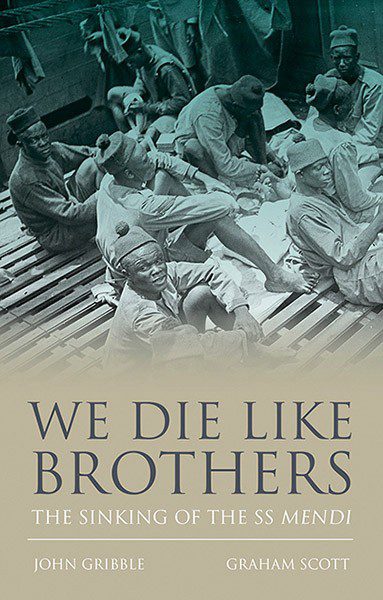WHILE AWARE OF THE WRECK of the World War One troop transport Mendi off the Isle of Wight, I was only vaguely conscious of the story behind it. This thoroughly researched new book by archaeological divers John Gribble and Graham Scott sets out that story clearly and methodically.
Because of this wreck’s unique background the book is worth investigating by any wreck-diver with a keen sense of history, and deserves to find a wider audience as well.
The sinking of the Mendi on 21 February, 1917 (yes, it’s another centenary) is commemorated nowadays both in South Africa and Britain, but for a long time it was one of those events that it suited the authorities to let lie.
When the ship collided in fog with a British vessel, the Darro, most of the 600-plus men who died were black South African volunteers for the SANLD (South African Native Labour Force), on their way to play their part in the Allied war effort.
These men were far from home and subject to military discipline, but they would not be allowed to bear arms or fraternise with anyone outside their ranks in case they should get ideas “above their station”.
In the days of the British Empire, the institutional racism that seems abhorrent nowadays appeared to be no more than common sense to the overlords of vast populations of black workers.
The men sailing in the cramped holds of the Mendi were vital to the war effort, expected to dig trenches or unload ships and leave white soldiers free to get on with the fighting.
While doing this work, they would be kept in conditions no better than those of prisoners of war.
Many had volunteered because they needed the work but often also in the vain hope that their contribution would further the cause of black liberation. Far from that, when millions of service medals were struck after the war for the victorious Allied troops, these men were conspicuously excepted from such an honour.
The authors go into considerable detail about the SANLD (and other colonial labour forces), leading up to the sinking and the unaccountable failure of the captain of the Darro to assist the survivors of the collision, many of whom died of hypothermia in unusually cold Channel waters.
The high – and unnecessary – death-toll made this one of the worst wartime sinkings off Britain. The career of the man commanding the Darro appeared largely unaffected.
And finally we get to the diving. The wreck was found in 40m by illustrious Isle of Wight-based wreck-diver Martin Woodward (see News this month) in 1974, and was much-plundered for spidge in succeeding years when, as the authors point out, taking souvenirs from such wrecks was “a common and largely uncontroversial practice”.
In 2007 this notable war wreck was protected, following its first archaeological survey, commissioned by English Heritage (now Historic England, publisher of this title).
Too many books about famous ships end with the sinking or carry a token reference to the wreck, but the Mendi s continuing story under water is thoughtfully treated, and many of the more important finds are described and well-illustrated, and the wreck’s condition detailed.
There is also a revealing chapter about the enduring myth of the Mendi – the story of older volunteer and clergyman Isaac Dyobha, reputed to have rallied the SANLD men in their hour of need and to have led them in a “dance of death”. The story is forensically examined by the authors and a rational conclusion reached.
Only occasionally, as with Dyobha’s background, might you feel that this tale is being told in more depth than is strictly necessary. Otherwise this book is a good example of archaeological divers shining a light into dark places, resulting in a readable, sure-footed and thought-provoking book.
Steve Weinman
Historic England
ISBN: 9781848023697
Hardback, 190pp, £17.99

